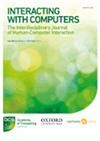你不是我的老板,算法:增加用户控制和积极的内隐态度与更严格地遵守算法辅助有关
IF 1.3
4区 计算机科学
Q3 COMPUTER SCIENCE, CYBERNETICS
引用次数: 1
摘要
这项研究考察了参与者对算法辅助的坚持程度是否与他们在决策点受到的控制程度以及他们对新技术和算法的态度有关。它还测试了控制对参与者在使用辅助工具时对任务需求的主观报告的影响。共有159名参与者完成了一项以模拟预测任务为中心的在线实验,该任务要求参与者预测学生在标准化数学测试中的表现。对于每个学生,参与者还收到了由算法生成的分数预测。参与者被随机分配到“完全控制”(根据自己的意愿调整预测)、“适度控制”(调整预测30%)或“限制控制”(将预测调整2%)组。然后,参与者完成了对主观任务负荷的评估,这是对他们对新技术、人口统计和经验项目(年龄、性别和计算机素养)的明确态度的衡量,以及一个新版本的Go/No-Go关联任务,该任务测试了他们对算法的内隐态度。结果显示,对最终预测有更多控制权的参与者往往偏离预测的幅度更大,沮丧程度也更低。此外,研究发现,对算法表现出更积极的内隐态度的参与者与算法预测的偏差较小,无论他们受到的控制程度如何。研究结果暗示了用户在接受和挫败使用新型算法辅助时的控制和预先存在的态度的重要性,这可能最终有助于他们在工作场所使用算法辅助。这些发现可以指导系统开发人员,并支持工作场所实施专家系统技术。本文章由计算机程序翻译,如有差异,请以英文原文为准。
You’re Not the Boss of me, Algorithm: Increased User Control and Positive Implicit Attitudes Are Related to Greater Adherence to an Algorithmic Aid
This study examined whether participants’ adherence to an algorithmic aid was related to the degree of control they were provided at decision point and their attitudes toward new technologies and algorithms. It also tested the influence of control on participants’ subjective reports of task demands whilst using the aid. A total of 159 participants completed an online experiment centred on a simulated forecasting task, which required participants to predict the performance of school students on a standardized mathematics test. For each student, participants also received an algorithm-generated forecast of their score. Participants were randomly assigned to either the ‘full control’ (adjust forecast as much as they wish), ‘moderate control’ (adjust forecast by 30%) or ‘restricted control’ (adjust forecast by 2%) group. Participants then completed an assessment of subjective task load, a measure of their explicit attitudes toward new technologies, demographic and experience items (age, gender and computer literacy) and a novel version of the Go/No-Go Association Task, which tested their implicit attitudes toward algorithms. The results revealed that participants who were provided with more control over the final forecast tended to deviate from it more greatly and reported lower levels of frustration. Furthermore, participants showing more positive implicit attitudes toward algorithms were found to deviate less from the algorithm’s forecasts, irrespective of the degree of control they were given. The findings allude to the importance of users’ control and preexisting attitudes in their acceptance of, and frustration in using a novel algorithmic aid, which may ultimately contribute to their intention to use them in the workplace. These findings can guide system developers and support workplaces implementing expert system technology.
求助全文
通过发布文献求助,成功后即可免费获取论文全文。
去求助
来源期刊

Interacting with Computers
工程技术-计算机:控制论
CiteScore
2.70
自引率
0.00%
发文量
12
审稿时长
>12 weeks
期刊介绍:
Interacting with Computers: The Interdisciplinary Journal of Human-Computer Interaction, is an official publication of BCS, The Chartered Institute for IT and the Interaction Specialist Group .
Interacting with Computers (IwC) was launched in 1987 by interaction to provide access to the results of research in the field of Human-Computer Interaction (HCI) - an increasingly crucial discipline within the Computer, Information, and Design Sciences. Now one of the most highly rated journals in the field, IwC has a strong and growing Impact Factor, and a high ranking and excellent indices (h-index, SNIP, SJR).
 求助内容:
求助内容: 应助结果提醒方式:
应助结果提醒方式:


